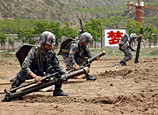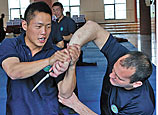
Vice-premier calls for public involvement in supervision
Vice-Premier Wang Yang urged public and civil groups to help supervise food safety, particularly through modern technology.
"Given major challenges facing the nation's food safety, like the colossal number of small businesses and a decentralized food production and processing model, a supervisory net highlighting the general public is essential to help ensure food safety," he said at the fifth China food safety forum as national food safety week kicked off on Monday.
Non-government industry associations of food producers should also play a role in enhancing food safety and quality, he said.
Wang cited practices in Guangdong province as an example.
"I regularly get text messages sent by the Guangdong food safety authority asking mobile subscribers, including me, to report any related irregularities or even crimes," he said.
New-technology tools like text messaging should be widely used to facilitate public involvement in food safety supervision, he said.
The forum was held by government agencies including the food safety committee under the State Council, the Ministry of Public Security, China Food and Drug Administration and the National Health and Family Planning Commission.
Xu Jinghe, director of the legal affairs department under the China Food and Drug Administration, said that more public supervision is being considered in the ongoing revision to the country's Food Safety Law.
"The revised law will better encourage and facilitate that," he said.
Previous reports said the revision was expected to be finished by the end of the year.
Specific items like rewarding tips and reports from the public, corporate insurance or self-insurance programs, online food trading, and a food safety tracing mechanism are being considered, Xu said.
Special funds have been established in some regions to reward useful public reports of food safety scandals.
But "few worked well to encourage public involvement", he said.
If it was included in the food safety law, however, "the situation would be largely different", said Li Shichun, a law expert specializing in food safety with the China Law Society.
"The feasibility of the new legal articles should be carefully studied to help with enforcement," he said.
For example, the public should at least have easy and wide access to report food safety problems, he said, adding that measures like introducing a third party channel to receive public reports should be considered.
"Many people are now reluctant to report for fear of leakage of private information and potential revenge by those breaking the law," he said.
Zhang Yong, chief of the China Food and Drug Administration, said that regulation of food safety is part of social management, so it requires participation of all stakeholders including government agencies, the public and the food industry.
"Government supervision and law enforcement alone can hardly ensure food safety given its great variety and complexity," he said.
However, "industry practitioners should be first in line to ensure and be accountable for food safety and quality," he said.
Zong Qinghou, chairman of beverage giant Wahaha, said: "To ensure food safety, all those involved in the food chain, including farmers, producers and sellers, must maintain credibility and be honest to consumers, and provide safe and healthy food."
A fair distribution of profits among producers and sellers is also important for food safety, he said.
"A prominent problem for the food industry is that most profits have been taken away by retailers, such as big shopping malls, forcing food producers to keep agricultural products that they buy from farmers at a very low price," he said. "This results in little profit for farmers, forcing them to ignore the quality of agricultural products or even adulterate them."
Fair prices should be ensured for farmers to sell agricultural products to improve food safety, he said.
















 Shocking! Hairy stocking to beat sex harassment
Shocking! Hairy stocking to beat sex harassment


![]()
